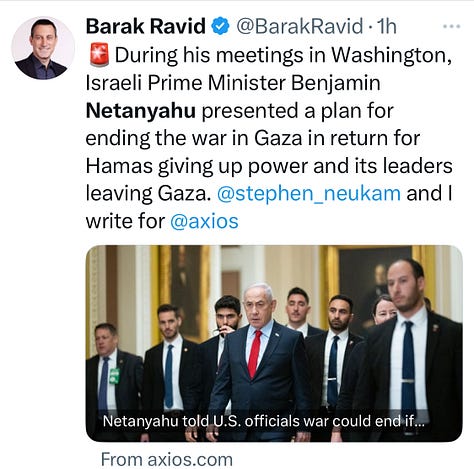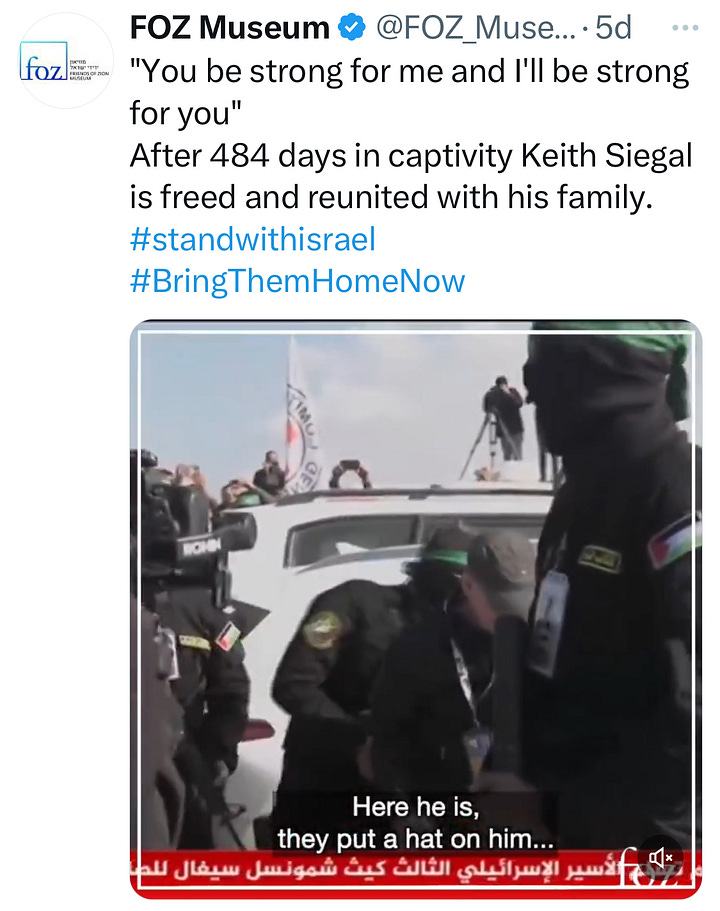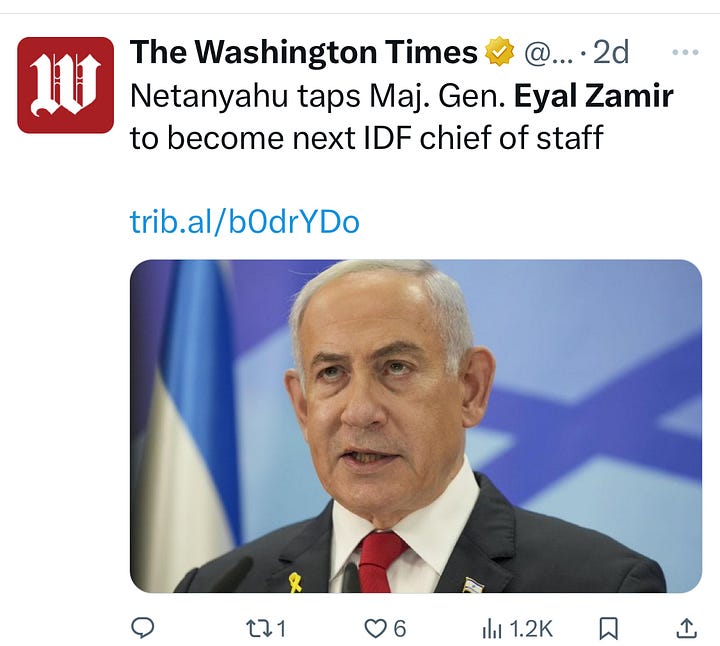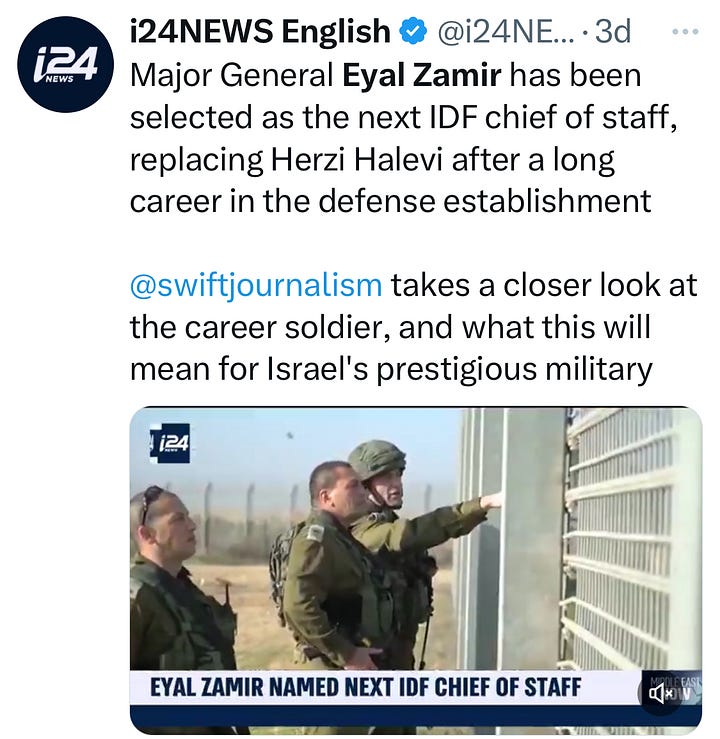Israel at War - Day 490
Gaza Ceasefire - Day 19
1. President Trump Suggests Transfer of 1.8 Million Gaza Residents
At a meeting in the White House on Monday afternoon with PM Netanyahu, President Trump laid-out his plan for Gaza: evacuate all 1.8 million [sic] people to Egypt and Jordan, destroy what is left, remove all the rubble, and then build a whole new Gaza. President Trump insisted that it is a feasible plan, he stressed that the area is a beautiful place with beautiful beaches that could be the “Riviera of the Middle East”. President Trump added that American forces will take-over the Gaza Strip.
PM Netanyahu was the first foreign head of state to meet President Trump after the elections. At the photo-op before the meeting in the oval office, President Trump answered questions from the press, elaborating on his plan. He added details at a press conference after the two hour meeting.
In an interview with Fox, PM Netanyahu said that “It’s a remarkable idea, and I think it should be really pursued, examined, pursued and done…”. Egyptian President a-Sisi and King Abdullah of Jordan have already rejected such a plan, and said that they will not cooperate. The Palestinian Authority also rejected the idea.
Later it was reported that President Trump’s staff tried to downplay the idea, especially the part that talks about American involvement on the ground. Many indicated that the whole plan is a violation of international law that forbids expulsion or the evacuation of people by force. It was also said by analysts that if Jordan would be forced to accept hundreds of thousands of Palestinians from Gaza, the kingdom will fall apart further destabilizing the region.
On the other hand, many in Israel rejoice and embrace the plan. Many in Israel would love to see the people of Gaza gone. Many in Israels government would happily adopt the idea, which completely aligns with the ideology for the Jewish State to control the whole area.
In the background of all this is a plan to re-arrange the Middle East including diplomatic relations between Israel and Saudi Arabia. But right now leaders in Saudi Arabia have not only rejected the evacuation plan, together with all Arab countries, but have also stressed that any relations with Israel must include real steps towards establishing a Palestinian State.



2. Three Israeli Hostages and Seventy-Two Palestinian Prisoners Released
On Saturday, three Israeli hostages were released in exchange for 72 Palestinian prisoners. After enduring 484 days in Hamas captivity in Gaza, Yarden Bibas (35), Ofer Kalderon (54), and Keith Siegel (65), a dual American Israeli citizen, were reunited with their families. They were subsequently transported to a hospital in Tel Aviv for comprehensive medical evaluations. Initial reports from medical staff and family members reveal that the hostages suffered from malnutrition and physical and mental abuse.
The families of the released hostages expressed their gratitude to the Israeli public, the Israel Defense Forces (IDF), and all individuals involved in facilitating the release of their loved ones. They emphasized the ongoing necessity of public advocacy for the release of all remaining hostages.
Ofer Kalderon was reunited with his four children, two of whom, Erez and Sahar, were also taken hostage on October 7, 2023, and released during the first ceasefire/hostage agreement of the year. Yarden Bibas was welcomed by his father and sister, while his wife, Shiri, and their two children, Ariel (4) and Kfir (2), who were also taken hostage on October 7, whose current status remains uncertain. Keith Siegel was reunited with his children and his wife, Aviva, who had been held captive for over fifty days before her release in the initial ceasefire/hostage agreement in 2023.
As part of the ceasefire agreement, 72 Palestinian security prisoners and 111 Gazan detainees were released from Israeli detention facilities. Of the 72 security prisoners, fourteen individuals were serving life sentences, one of whom was implicated in a bombing that resulted in the deaths of 17 Israelis.
Additionally, in accordance with the ceasefire agreement, hundreds of injured Gazans began departing for Egypt for medical treatment as of last Saturday, with plans for daily departures to continue. Israel will also permit Hamas militants to travel to Egypt for medical care.





3. Israel Has a New Chief of Staff - Eyal Zamir
After a short evaluation and some interviews - PM Netanyahu and defense minister Katz chose the next chief of staff for the Israeli Defense Force. Eyal Zamir competed for the position in the last round when the current chief of staff, Herzi Halevi was chosen. When Zamir was not chosen, he left the army and became the managing director of the defense ministry. Zamir will replace Herzi Halevi. Halevi announced right after October 7th that he takes all responsibility for the military failure and that he will resign in due time. There is no doubt that the army failed in all dimensions on October 7th - both on the intelligence level, to identify and analyze the preparation of Hamas to carryout a large scale attack on Israel, and on the operational level, to protect the small communities on the border that were brutally attacked.
When Israel Katz was recently nominated Minister of Defense, he pushed Halevi to resign. Zamir will have to restore the public trust in the Army after the crisis of October 7th and the resulting failure.
It is important to say that the responsibility for the October 7 failures does not lie solely on the shoulders of the army, but also on the political level which was behind the doctrine that crafted the formula according to which strengthening Hamas is the best way to prevent the establishment of a Palestinian State. But until now, no politician has taken any responsibility for the events. Primarily PM Netanyahu absolves himself of all responsibility, and the government refuses to establish an official state investigative commission to investigate the events and wrongdoings that led to October 7th.


4. Six Killed in Firearm Violence in Arab Communities
Six Arab citizens, including a fourteen-year-old boy and a physician working in a pediatric clinic, were killed this week, as firearm violence in the Arab community surges. A total of 26 people have been killed in firearm violence in Arab communities since the beginning of 2025, double the number compared to the same period in 2024.
Arab communal and political leaders pointed fingers at the Ministry of National Security and the police for their failure to crack down on gun violence and gang violence in Arab communities.
Veteran lawmaker Ahmad Tibi (Ta’al) said, in an interview with an Israeli English language news outlet that underworld organizations in the Arab communities in Israel have gained tremendous power due to years of police neglect. He added: “In practice, Arab society does not feel the presence of the police, they feel the presence of criminal organizations. It’s as if these organizations are a state within a state — they set the pace, they murder time and time again, and the police can’t stop them.”
5. Police Investigation of Ben Gvir Aides:
Some of the closest aides of ex-minister of national security, Itamar Ben Gvir, are under police investigation. Among them an ex member of Knesset. They are suspected of interfering with a Shin Bet investigation of Jewish attacks on Palestinians in the West Bank. The story broke some weeks ago, and revealed an alleged case where police officers, extreme right wing political advisers, and aides of Itamar Ben Gvir worked together to disrupt an investigation of Jewish terror in the West Bank. They are suspected of telling the activists, who were being secretly tracked by the Shin Bet, to take care because there is a confidential investigation. That of course killed the investigation.
Itamar Ben Gvir, head of Otzma Yehudit (Jewish Power) was the minister of national security, in charge of the police. He resigned because he was against the hostages deal. Ben Gvir said that the war in Gaza should continue, that Israel should not give up on it, and should not agree to a ceasefire. He said that only more force will put pressure on Hamas so that they will agree to release the hostages. Ben Gvir announced that he will join the government if PM Netanyahu decides to continue the war once the first phase of the hostages deal is over. PM Netanyahu has not nominated a permanent new minister to replace him and he is keeping the position open for Ben Gvir to return.
The police investigation revealed how people in office with a strong political ideology allegedly prefer the ideology over the rule of law. It is important to say in this context that the violence in the West Bank has increased significantly since October 7th, and since Ben Gvir took office.







